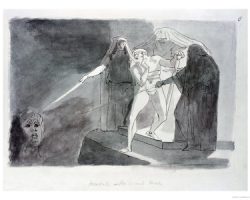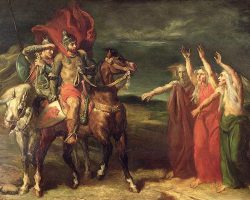
Shakespeare’s Macbeth – A Scene By Scene Synopsis (Act 3)
Macbeth Synopsis – Act 3 Scene 1
At the palace in Forres, Banquo reflects on the newly crowned king’s rise to power. He suspects Macbeth of foul play but has not challenged him.
Banquo cannot forget the witch’s prophecy that he will father a line of kings. In some ways their fates are meshed.
Macbeth interrupts Banquo’s thoughts, commanding him to be at the evening banquet. Banquo is to be chief guest. Macbeth draws information from Banquo about his movements for the rest of the day, discovering that he plans to ride a fair distance with his son Fleance, returning at nightfall. Banquo sets off and Macbeth dismisses Lady Macbeth and the rest of the court.
Alone, the mask falls. Macbeth feels unsafe on the throne. He believes that the chief threat lies in Banquo. Macbeth doubts his loyalty, and fears that he may simply be biding his time before making a move. Moreover, Macbeth is anguished by the prophecy that it will be Banquo who founds a royal dynasty, and not himself, Macbeth is ready to challenge fate itself by killing Banquo and his son.
Two desperado’s, down on their luck, are persuaded by Macbeth that their ill-fortune is due to Banquo, and they agree to murder Banquo and Fleance that evening.
Macbeth Synopsis – Act 3 Scene 2
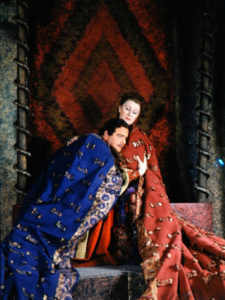
Lady Macbeth sends a servant to her husband, requesting a private audience. While she waits, she lapses into sorrow. She has found no joy as Queen. But when Macbeth joins her, she hides her despair. Instead she chides him for brooding alone, and coaxes him to forget the past. Macbeth reminds his wife that they are still in danger, and tells her to flatter Banquo, their chief enemy. Lady Macbeth is disturbed by Macbeth’s obsession with Banquo. Although he hints at the dark deed planned, Macbeth does not confide in her. This time Macbeth is able to act without her support.
Macbeth Synopsis – Act 3 Scene 3
The two assassins, together with a third sent by Macbeth, ambush Banquo and Fleance as they approach the palace at dusk. In the confusion Fleance escapes, but Banquo is brutally stabbed to death.
Macbeth Synopsis – Act 3 Scene 4
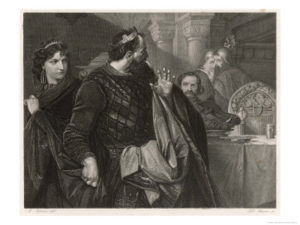
Inside the palace, the nobility of Scotland assembles in the banqueting hall for the great feast. Macbeth bids them to be seated according to their rank, and the royal hosts are lavish in their welcome. As Macbeth mingles with the guests, he catches sight of one of the assassins lingering on the fringe. Slipping away to join him, Macbeth is relieved to hear that Banquo is dead, but enraged at Fleance’s escape. However, that threat lies in the future, and Macbeth puts it aside. Macbeth enjoys a fleeting moment of security as he toasts the company, and remarks on the absence of the chief guest, Banquo. Ross urges him to join the table, but Macbeth doesn’t see a spare seat. Lenox motions him to an empty chair. Macbeth is aghast. Banquo has kept his promise to attend the feast: his ghost sits in Macbeth’s seat. Macbeth speaks wildly to the ghost.
The thanes are alarmed at the sight of their king addressing an empty chair. No one, except perhaps Lady Macbeth, has any inkling of Banquo’s fate. Lady Macbeth desperately tries to deflect attention from the king: it is just a passing fit, best ignored. Whispering urgently to Macbeth, she tries to shame him into self-control. But Macbeth is hysterical with fear, and Lady Macbeth’s efforts are futile.
When the ghost disappears, Macbeth recovers and sits. He again toasts the company, and the absent Banquo. On cue, the ghost re-appears. Macbeth is convulsed with terror and rage. He has lost all instinct for concealment. Lady Macbeth is on a knife-edge of terror in case he exposes them both as murderers. The queen tries to cling to some shreds of royal dignity, but Macbeth’s ravings cannot be ignored. She dismisses the bewildered guests, and the company breaks up in disorder.
Left alone, Lady Macbeth is too exhausted even to reproach her husband for putting them both in such peril. But Macbeth, with Banquo’s ghost gone, immediately turns to new problems – Macduff who has flouted the royal summons, and his own uncertainty about the future. He decides to visit the witches again, and force more information from them. Macbeth is determined to be utterly ruthless in cementing his power. Already he has thrown an intelligence network over the kingdom: in every noble household there is a spy in the kings pay. Macbeth resolves to stop at nothing to make his power absolute. He will wade even further in blood. Macbeth puts his earlier terror at Banquo’s haunting down to inexperience in dark deeds – he will be tougher in future.
Macbeth Synopsis – Act 3 Scene 5
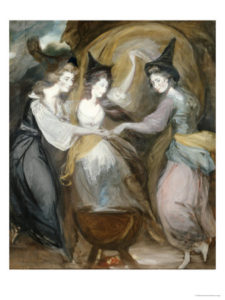
Although Macbeth does not yet know it, his future dealings with the witches will involve a stronger power. The witches are subservient to the dark goddess Hecat, who now scolds them for daring to speak to Macbeth without her guidance. Macbeth, she tells them, acts for his own ends, and not for love of the witches or what they represent. From now on, she will take charge of the oracle-making. The witches are commanded to meet Hecat at the pit of Acheron – the gates of hell – the next morning. They will cast the spells. But it is Hecat who will determine what Macbeth sees: she will make him feel secure through the power of illusion.
Macbeth Synopsis – Act 3 Scene 6
Meanwhile, discontent is growing in Scotland. There is gossip about the deaths of Duncan and Banquo. But some are wary about declaring Macbeth a murderer. Lenox uses double-speak in conversation with another lord: on the face of it, he sounds loyal, but there is deep sarcasm underneath. The other lord is less cautious; he calls Macbeth a tyrant outright and reveals that Macduff has fled to the English court, there to help gather an army to restore Duncan’s line. Lenox, now more sure of the other lord’s sympathies, declares himself for the Scottish exiles in England.
Macbeth Synopsis – The Other Acts
More Macbeth Essays and Articles
Lady Macbeth – A Fiend Or A Caring Wife?
Is Lady Macbeth really an evil fiend-like queen? Selfish, bullying and cruel? Or is Lady Macbeth simply ambitious for a husband whom she loves, …
Was Macbeth A Villain Or A Victim?
If you have seen Macbeth performed on stage several times you will realise that no two Macbeths are ever played in quite the same way….
Macbeth Themes – Ambition and Power
The theme of ambition in Macbeth is linked to that of good and evil. Like many other passions and impulses, ambition can be both foul and fair…..
Macbeth Themes – Relationships
Firstly, there is the relationship between husband and wife, seen in the marriage of Macbeth and Lady Macbeth, and of Macduff and Lady Macduff……
Macbeth Themes – Good and Evil
The theme of good versus evil is at the heart of Macbeth. The witches set the tone at the very beginning: fair is foul and foul is fair. Good and evil exist …
My Favourite Shakespeare Play, Macbeth
I first came across the story of Macbeth at school when reading Shakespeare, and his play Macbeth in particular, was a chore that had to be faced!…

